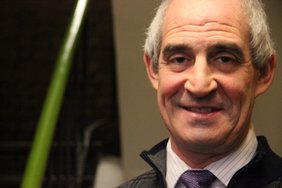NEW YORK CITY: The Lark, a play development laboratory dedicated to amplifying the voices of playwrights, has announced that founder John Clinton Eisner will be stepping down after 27 years as artistic director. Eisner announced his intentions to step down in January 2020, and through a search process run by a committee comprising Lark artists, staff, and board, a new artistic director was selected in January 2021, and will be announced next month.

“It is a critical moment of inflection both inside and outside the Lark, and we’ve used this time of crisis to hold space for our affiliated artists and align our mission and values with our plans for the future,” Eisner said in a statement. “What we imagined in soft focus a year ago has become tangible reality through the collaborative action of a group of stakeholders who care deeply about the Lark and its community. This is a consequential moment of passage for the organization and the artists we serve.”
“John Clinton Eisner has laid a foundation for play development that has served so many, including me,” said the Lark’s executive director, Stacy Waring. “It is a legacy befitting of this moment in history and it is an honor to continue the work of liberation and access for playwrights.”
Founded in 1994, the Lark was established as a counterpoint to the prevailing commodity-based culture of theatre. During Eisner’s tenure, the Lark established new initiatives and programs meant to support the development of new plays and the playwrights who write them. The inaugural Playwrights’ Week in 1995 revealed a field-wide need to support new voices, thus spurring the organization to focus on new-play development.
The Lark continued to evolve to become entirely playwright-centric, and today prioritizes voices that have been historically under-resourced and marginalized through an acclaimed portfolio of fellowships that support artists at all stages of their careers, including the Apothetae and Lark Playwriting Fellowship and Initiative, which supports disabled artists; the Van Lier New Voices Fellowship, which supports playwrights of color aged 30 and under; and the Venturous Fellowship, supporting risk-taking plays.
“John Eisner created and guided the Lark to become a vanguard organization, empowering playwrights when our plays were in danger of being over-developed by theatres and facilitating international exchange when few other organizations supported this work,” said Lark board member and playwright David Henry Hwang. “We are deeply grateful to John for his service, vision, and hard work, and wish hi well on his next creative chapter. He remains an inspiration to us all.”
Trained as an actor, Eisner began his transition to directing and producing through his experiences at the Eugene O’Neill Theater Center’s National Playwrights Conference, the National Theatre of the Deaf, the Denver Center Theatre Company, and Williamstown Theatre Festival (where he acted in one of Tennessee Williams’ last plays, Gideon’s Point). He worked in casting for Johnson-Liff Casting Associates, ticket sales at the Roundabout’s Criterion Center Box Office, and as
managing director and associate artistic director at Rhode Island’s Colonial Theatre (where he co-founded Westerly Shakespeare in the Park, now in its 25th season, and Plays in Progress, a program that eventually led to the formation of the Lark). He has directed plays by Calderon, Yeats, Wilder, Shakespeare, John Patrick Shanley, Jeroen van den Berg, Anton Dudley, Aditi Brennan Kapil, Elizabeth Logun, Ian Rowlands, and Lloyd Suh, among others, and worked with hundreds of writers on new plays at the Lark, including Kristoffer Diaz, Katori Hall, David Henry Hwang, Rajiv Joseph, Arthur Kopit, Koffi Kwahule, Javier Malpica, Theresa Rebeck, Saviana Stanescu, Sinan Unel, Tracey Scott Wilson, and Karen Zacarías. He has led workshops at many universities and served as advisor for CEC Artslink, the National Endowment for the Arts, New York State Council on the Arts, Theatre Development Fund, Theatre Communications Group, National New Play Network, TheatreForum magazine, Transport Group and the Lucille Lortel Awards Committee, and on the boards of the National Theatre Conference and the Shakespeare Theatre Association of America (of which he was a charter member).

